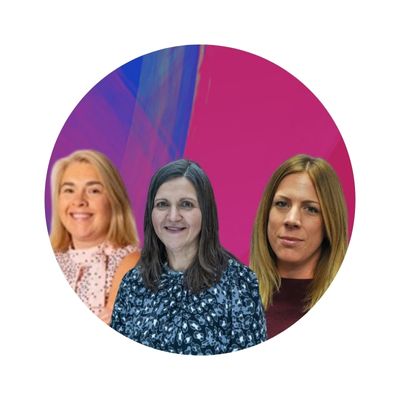Pathways to Success: Progression after T Levels

Earlier this year, the Education and Training Foundation held two ‘T Level Learning From’ events, bringing together T Level practitioners from across the country. Here, Ruth Coyle, Roz Hicks and Lucy Whitwood reflect on the practical learnings and advice from a breakout session they designed for the events.
With the new academic year under way, thousands of students across the country will be embarking on their T Level journey, likely filled with a mix of nervousness, hope, and excitement about what pathways this qualification will offer. Those working at FE colleges, schools and sixth forms delivering T Levels for the first time will probably be sharing in many of those emotions.
Those feelings are something Ruth Coyle, Roz Hicks, and Lucy Whitwood can all relate to. Now experienced in delivering T Levels, they remember how it felt starting on their T Level journey.
Earlier this year, all three worked together to develop a breakout session for the Education and Training Foundation’s (ETF) ‘T Level Learning From’ events in Leeds and London, which brought T Level practitioners together to network, learn from one another, and access support from the Department for Education-funded T Level Professional Development (TLPD) offer. Ruth, Roz and Lucy’s session on Progression from T Levels shared their learnings and advice for those new to, or already delivering, T Levels.
Having now passed the milestone of the second ever T Level results day this August – and having seen their students progress onto a rich range of pathways – Lucy, Roz and Ruth share their reflections on their Progression from T Levels session and the key points they would reiterate to providers on their T Level journey.
The road ahead
Why hold a session specifically on the topic of progression from T Levels?
“You always want to have the end goal in mind,” says Ruth. “Introducing T Levels is a challenge, it’s a new thing. You need to think about what this is doing for learners. For us, the key aim for our learners is to achieve social mobility and give them access to opportunities such as going into large corporates and getting experience. So, from the start, we’ve got to be thinking about what engages them and what they are going to excel at, so we can bring that out of them.”
Lucy agrees: “It’s so important to think about progression of the learner from day one. So, when you are talking about and marketing your T Levels, you’re looking at the career opportunities for those learners, what journey they will go on, the types of placement opportunities they can have, and the opportunities within the programme that will give them successful progression at the end. Selling the career, rather than the qualification, is so important.”
Roz adds: “From a teaching perspective, it’s also about building confidence of staff. One thing we promote at City College Norwich is the Industry Insights part of the TLPD offer, so staff can do their own industry placements, update their skills and bring new and relevant knowledge back into the classroom. That means our learners are ready to enter the workforce with up-to-date skills and can more easily access those progression opportunities as a result.”
Providing reassurance
Through the Progression from T Levels breakout session, Ruth, Roz and Lucy were keen to provide reassurance to other providers, particularly those new to delivering T Levels.
Roz says: “For providers who have started delivering this September, or that are due to start next September, we recognise there is still a lot of anxiety in the sector about what the qualification is and how it compares with A levels, BTECs and other applied general and technical qualifications at Level 3. The ‘T Level Learning From’ events provided opportunities for people to bounce ideas around and discuss challenges and work through solutions together.”
Lucy recounts the range of topics that were asked about in the session: “Delegates had a lot of questions about how the curriculum was structured, how we organised placements, what the opportunities were for learners beyond the qualification, and how successful university and apprenticeship applications were. We really got into discussing the intent of the course and how to ensure success at the end of it.”
Ruth picks up on a particular challenge for new providers: “I think a lot of people are quite anxious about the industry placement side of it. The key is reaching out to as many people as you can about engaging with your centre. Talk to the employers you currently work with, talk to the staff you have and see if they know people working in business, talk to your governors. Your contacts don’t necessarily have to take a student for industry placement – they might just want to come in and give a talk or set up some kind of virtual activity. But often it’s through those activities that the employer’s confidence grows. They see the students’ skills and potential and become more likely to offer placements.”
Inspiring stories
It’s on days like T Level results day that all the hard work towards creating those career opportunities materialises. Ruth shares just some of the success stories from her students this year: “Our student Ajrienne got an apprenticeship with Lloyds Bank as a software engineer, and Rachel got a degree apprenticeship with Santander. Zoe worked for Lloyds during her placement and now has an apprenticeship there as a business analyst.
“Daniel, who did the T Level Foundation course then came onto the digital T Level, is now going to university to do software engineering. Another student started on the T Level Foundation course doing childcare, but realised that wasn’t right for him and switched to construction. He now works at ISG. We have so many stories of success.”
Roz notes that recognition of T Levels is growing, which positively impacts progression opportunities: “With this being such a new qualification, a lot of these opportunities for progression after T Levels are still opening up. For example, some universities were initially hesitant about taking T Level students, but that’s changing quickly. We now see our students going onto employment, apprenticeships, or university.”
Explaining how pathways have differed across different types of T Levels, Lucy says: “The education and childcare (now education and early years) route has generally seen higher progression into employment than university, which is similar to before the introduction of T Levels for that subject area. The digital T Level has produced more of a shift in the landscape, with more learners going onto employment and higher apprenticeships than to university. We’ve also seen a significant shift into higher apprenticeship opportunities in construction. These are all really positive moves for our learners.”
Sharing the learning
Ruth, Roz and Lucy all comment on the positive culture of collaboration around T Levels and the benefits of sharing best practice between providers, often facilitated by events such as the ETF’s ‘T Level Learning From’ events.
“I’ve been in education a long time, and this is the first time I’ve seen something so nationally coordinated,” Roz says. “Colleges, schools and sixth form centres are all working together and sharing. It’s the first time I’ve seen people so open about what they’re doing, sharing curriculum designs or schemes of learning, and how they’ve decided to organise their placements. The ‘T Level Learning From’ events provided those opportunities to network and share learnings and experiences. And that collaboration is so productive – it demonstrates a joint desire to work towards something positive.”
Ruth agrees: “It doesn’t matter how long you’ve been delivering T Levels, you can always pick up new ideas from different providers. I think it’s always good to refine your approach and look for best practice. All of the sharing at those events is invaluable, and people then continue those networks afterwards.”
Lucy adds: “Because we’re early adopters, I think sometimes we forget to look back at the journey we’ve been on, and it’s important for us to take time to reflect. Sharing those experiences at events puts that fresh in our minds again and is really positive. And even where there have been challenges in delivery, an event like ‘T Level Learning From’ gives us an opportunity to hear similar challenges that others are facing and to collaborate to find solutions.”
A word of advice
For providers early on in their journey, what’s the main piece of advice Ruth, Roz and Lucy would share?
Ruth says: “There are the obvious things like staffing, curriculum and working with employers, but actually the marketing is really important. Being a school, we start talking to our students in year seven about T Levels, and even when we go out to primary schools and talk to year six, we’re sharing what our T Level students have achieved. Getting parents and employers involved is very helpful as well and highlights that confidence in the qualifications.”
“There are two key things for me,” Lucy says. “Plan to provide opportunities beyond the qualifications that will inspire your learners, because that’s the route to progression. And seek key employers to help build that foundation of progression. So many of our learners get offered jobs and apprenticeships as a result of their industry placements, so the employers end up working with those learners throughout the whole qualification process and seeing the progression at the end.”
Roz concludes: “I think in education we sometimes tend to focus on the negatives. With T Levels, they’re still so new, and we’re all finding our feet together. So, my key bit of advice would be to celebrate the successes – look at what is going well and celebrate it. That way, when you face challenges, you can use the positivity from your successes to look into those challenges and develop effective solutions.”
Ruth Coyle, Director of Admissions, Career and Technical Education at La Retraite Roman Catholic Girls’ School, Roz Hicks, Head of Media, Business and Digital Industries at City College Norwich, and Lucy Whitwood, Director of Technical Education and Apprenticeships at City College Norwich
FE News on the go…
Welcome to FE News on the go, the podcast that delivers exclusive articles from the world of further education straight to your ears.
We are experimenting with Artificial Intelligence to make our exclusive articles even more accessible while also automating the process for our team of project managers.
In each episode, our thought leaders and sector influencers will delve into the most pressing issues facing the FE sector, offering their insights and analysis on the latest news, trends, and developments.












Responses